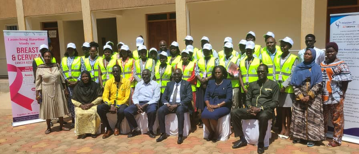Mission 21, a global faith-based community organization, on Thursday launched a breast and cervical cancer assessment in Juba aimed at gathering information and data to expand health awareness and screening programs, enhance early detection of breast cancer, and strengthen healthcare infrastructure, among other objectives.
Speaking during the launch, Florence Roba, the country representative of Mission 21 in South Sudan, said cancer continues to pose a major health challenge in the country, highlighting that it is often detected at a late stage when treatment becomes difficult.
Roba stated that the assessment will not only provide professional opportunities for South Sudanese women and girls but will also generate valuable data to help the health sector respond more effectively to cancer cases.
“For too long, cancer has caused a silent yet challenging threat,” she stated. “Often detected after it has progressed, complicating treatment options.”
According to her, many families in South Sudan have experienced the pain of cancer.
“Many of us have been touched by this disease, whether through families, friends, and neighbors,” Roba said. “These stories of courage and loss, with caring, fueled our commitment, determination to underscore the importance of our gathering here today.”
She added that the launch of the assessment marks a significant shift from mere awareness to proactive action, focusing on early prevention and data collection.
“Today marks a critical transition from a reality to a proactive approach with the launch of the breast and cervical cancer assessment initiative,” Roba said. “This assessment will focus on awareness and incidences of breast and cervical cancer among women aged 18 to 17 in Juba.”
She added, “Specifically, we aim to understand knowledge, attitudes, the practices related to cancer prevention.”
For his part, Kabuye Gerard, the lead consultant for the assessment exercise, said the process is scheduled to begin on 10 November through December 2025 will employ a comprehensive approach, including both primary and secondary data collection methods.
He explained that these will include literature reviews, key informant interviews, focus group discussions, structured questionnaires, and house-to-house surveys.
“We have limited data and awareness within this country that we must create, and I am so happy, Mission 21 is the one beginning to provide us with the best life indicators,” he said.
Kabuye further emphasized that the purpose of the survey is to obtain firsthand, locally-sourced information rather than relying on foreign-generated data.
“We sit in Washington, we sit in London, we sit in the Netherlands, we sit in head offices and create indicators for South Sudan, not knowing the reality on the ground,” he added.
Meanwhile, Justin Bruno Tongun, a representative of the national and state health ministries, cautioned the organization to ensure that accurate data is collected, rather than formulating information without proper verification. He urged Mission 21 to involve the right people in the process, including community leaders and cancer specialists in South Sudan, to ensure the study’s legitimacy.
“Cancer is real, and it is a big problem. We have a specialist for this particular cancer here, and I am requesting Mission 21 to please involve her. She’s a gynecologist, obstetrician who started in Kenya. She has come back home and she’s supervising cancers of women,” he said. “So you cannot afford to have this mission going on without involving them. You must have the right people in the right places at the right time to do the right thing. They will guide you on what needs to be done, on how you need to do it. This study can start rolling on, but start engaging them as soon as possible.”
According to Mission 21, the assessment will cover the Juba City Council and Juba County. Upon completion, the findings will be validated and published.




